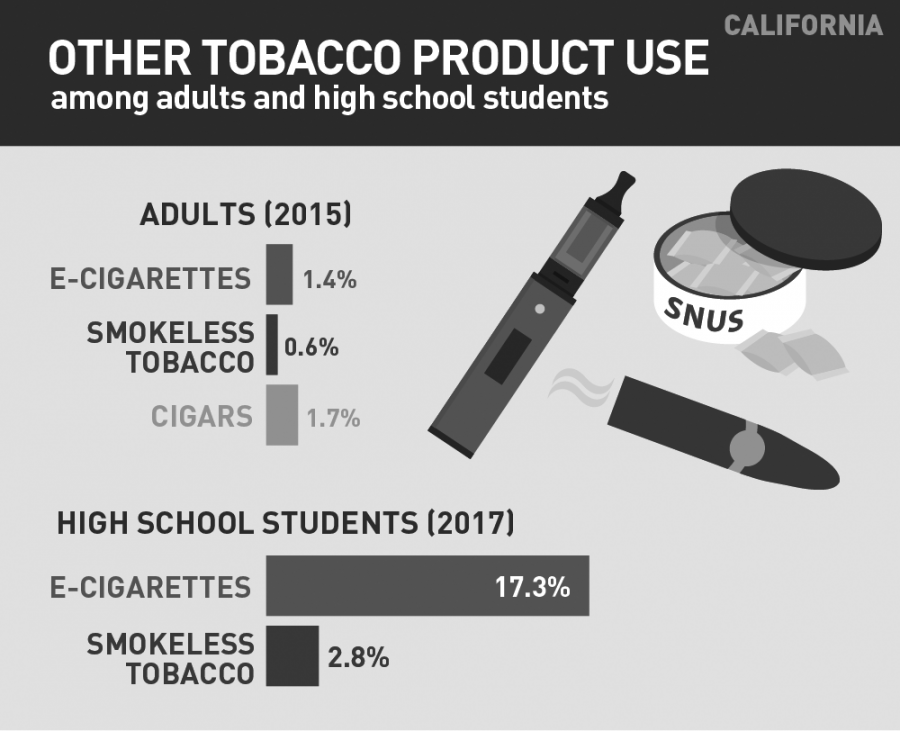Debating the safety, health of smoking
Yes,
Imagine a termite gnawing at your living flesh. Now imagine you had the ability to remove that termite, and if you removed it, you would be filled with the most glorious feeling of contentment and warmth. Imagine removing it would bring you to a level of happiness you had never achieved before, a personal nirvana that you never wanted to leave. Now imagine you are told not to remove it and to let the termite keep gnawing. That is addiction.
According to the Addiction Center, there are approximately 50 million people in America who are addicted to some type of tobacco product. Of those 50 million, 90 percent started smoking at the age of 18. That is 45 million teenagers. To put that into perspective, according to the United States Census Bureau, about 40 million people live in the state of California alone. That means that the number of teenagers picking up tobacco products is larger than the number of people living in California. That’s a lot of people. And it gets worse. According to the Addiction Center, “Because addiction changes the biochemical makeup of the brain, it becomes harder to quit the earlier a person starts using. Young people are more susceptible to forming an addiction.”
Nicotine is a sedative and a stimulant. When a person uses a tobacco product, they experience a surge of adrenaline that is caused by the nicotine. This surge stimulates the body and results in an increase in heart rate and blood pressure. That is one of the reasons why nicotine is highly addictive. According to Medical News Today, Nicotine has a large range of short and long term side effects. Some of the short term effects include nausea, vomiting, dizziness, indigestion, and diarrhea, while some of the long term effects include heartburn, obesity, type two diabetes, problems with brain development, joint pain, spasms in the lungs, increased levels of insulin, and respiratory difficulties. Senior Rachel Kerschenbaum said, “The legal age of nicotine should be raised because the brain does not fully develop until you are around the age of 21, and the use of nicotine has negative effects on that aspect of your body.”
Using nicotine can lead to other addictions, which puts teenagers at risk of becoming a lifelong addict and exposing them to many harmful chemicals in tobacco products. These chemicals can cause different types of cancer and harm nearly every organ in one’s body. Teens are especially sensitive to these dangerous substances as nicotine can rewire one’s brain at such a young age. According to Tobacco Free Kids, “About 350 kids under the age of 18 become regular smokers each day – one in three will eventually die as result.”
America needs to take more action on the increasingly significant issue of nicotine addiction. Raising the legal age to 21 will help prevent young people from being exposed to the harmful effects that the lethal chemical inflicts.
-Sarah LaMonaca
staff writer
No,
More teens than ever are starting to vape and use e-cigarettes. According to the Maryland Youth Risk Behavior survey, about one in five high school students in Maryland report using some tobacco products regularly, and more than 35 percent say they’ve tried vaping pens or e-cigarettes. Maryland wants to put a stop to this by introducing new legislation that will raise the smoking age to 21 years old. This includes buying and selling all tobacco products. If this is law is passed will go into full effect on Oct.1.
Over 450 cities and states including Arkansas, California, Delaware, and Illinois have enacted a law similar to the one being debated right now. Governor Larry Hogan just needs to sign off on it, and Maryland will join the majority. “I do think Hogan should approve it for the increased safety of students. I feel it is a reasonable law and could be effective in reducing the amount of people who smoke,” sophomore Olivia Vincent said.
Teens are believed to be too young for vices such as alcohol and tobacco. Yet 18-year-olds can enroll in college, vote, and rent an apartment. “I think an 18-year-old is old enough to make their own decisions,” Vincent said.
One issues students have addressed is peer pressure, which often leads to experimentation and even addiction. According to The Surgeon General.gov, The average age at which a person tries their first cigarette is 12. “Peer pressure is one of the main reasons why people smoke. People use drugs to distract themselves from their surroundings and if they are stressed. Some students will not change their actions if law changes because they are already addicted to the drug. The law won’t be enough. It is best to find a new replacement for drugs that will help people cope with their addiction,” sophomore Janet Li said.
Another concern students voiced is the how past laws have failed, as seen within the recent rise of e-cigarettes and vaping. “I don’t know anyone our age who smokes cigarettes, but I know about 10 people who vape. I think the law should be made more severe and taken just as seriously as the drinking age law. I think teens should be more restricted from these products,” Vincent said.
Smoking can be detrimental to one’s health and cause addiction in the long run. “18-year-olds brains are not fully developed and they are just experiencing freedom from their parents for the first time. I think the age should be 21 years old because 18 is too young and people are still in high school at the time. Students should focus on academics and not drugs that could ruin their life,” Li said.
Despite the risk of distribution, health problems, and addiction teens still deserve to keep their rights. To smoke or not, should be their call.
-Elana Tinelli
staff writer






![The 2025-2026 Editorial Board Alex Grainger, Cameron Cowen, Helen Manolis, Emory Scofield, Ahmed Ibrahim, Rebekah Buchman, Marley Hoffman, Hayley Gottesman, Pragna Pothakamuri and Natalie Pak (Chase Dolan not pictured) respond to the new MCPS grading policy. “When something that used to be easy suddenly becomes harder, it can turn [students’] mindset negative, whereas making something easier usually has a better impact. I think that’s where a lot of the pushback comes from. But if you put emotions aside, I do think this change could help build stronger work ethic,” Ibrahim said.](https://woottoncommonsense.com/wp-content/uploads/2025/09/fqr5bskTXpn0LRQMmKErLuNKdQYBlL726cFXBaWF-1200x900.jpg)

